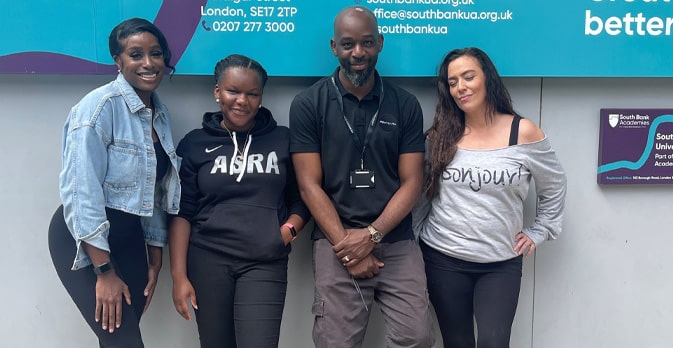PPL x Mentivity: Mentoring the music execs of tomorrow
Seven-week pilot introducing next gen to the music industry gets five-star feedback from students.

Song structures, contracts and the important business of getting paid were just some of the hot topics covered during a seven-week pilot programme – held at South Bank University Academy this summer – to introduce students to the realities of working in the music industry.
Supporting diversity and access in our industry
The pilot was the result of discussions between PPL and Mentivity, an educational charity that uses conversation-based learning to support students struggling with mainstream schooling.
PPL worked with Mentivity’s founder Sayce Holmes-Lewis in 2021 when he delivered a talk during Black History Month. We also donated a set of laptops and PCs to the charity’s educational hub, but our Equity, Diversity and Inclusion Partner Tomi Oyewumi was keen to do more.
During a brainstorm, the idea of a course emerged – one that would combine the charity’s student engagement skills and PPL’s music knowledge. Work began on jointly developing a seven-week course to kick-start PPL’s social mobility pledge programme and provide direct action in terms of moving the dial across the industry on access and opportunity.
In June, the pilot programme was ready for its first set of students.
Sharing lived experience of the music industry
Each week, Patrick Egbuchiem, an ex-music exec and Mentivity’s Senior Mentor & Safeguarding Lead, provided 16 Year 10 students with a power hour of insights and practical workshops. And during the second half of each class, volunteers from PPL shared their lived experience of how those insights shaped their work in the industry.
“The talks were a great way to bring our people’s skills to the table,” Tomi says. “By sharing what we do, we were able to show students first-hand that you don’t have to be an artist, a songwriter or know someone in music to work in this industry.”
PPL people bringing their A game
Presenting to peers is part of the day job at PPL, but teenagers can be a tough crowd. “Every one of PPL’s volunteers brought their A game,” Patrick says. “They prepped and didn’t hide behind stuffy PowerPoints – and most importantly, they pitched things from a realistic and sometimes vulnerable position, drawing the students in immediately. They could not have done it any better.”
“I saw one boy’s body language visibly change over the seven weeks,” Patrick recounts. “He started the sessions with his head slumped on the desk; at the end, he was the one asking all the questions. Now he wants to be a music producer, and he has the understanding of what he needs to do to make that happen.”
And it wasn’t just the students that were buoyed by the experience. In total, 16 people volunteered to take part. “I received amazing comments from the PPL team,” Tomi says.
Walking into the room where the young people were composing songs and even performing parts to complete strangers was courageous, says PPL Account Manager and volunteer Jiyla Cupit.
“I hope that they found our session, informative, engaging, and inspiring and that we’ve opened their minds to other opportunities and options they have within the music industry.”
Feedback from the students has been positive too. Nawaz, one of the year 10s who took the course at South Bank University Academy, says the programme encouraged him to take the music industry more seriously. “It always felt like it could only be a hobby before.”
Eight of the students who took part are now carrying on with music to GCSE level. And Patrick and his team at Mentivity are eager to develop the programme to meet the needs of Year 12 students approaching A levels.
Being the change we want to see
The success of the pilot is something that Tomi is keen to build on too. There are plans for a visit to PPL’s offices and discussions around mentorship and work experience. “The key thing for me is very very simple,” says Tomi. “It’s for PPL and our people to be the change we want to see.
That means have the majority of people thinking like that, not just me because I’m the EDI person, but everyone in PPL. And to understand that this is a daily thing and EDI doesn’t stop when this conversation ends.”



